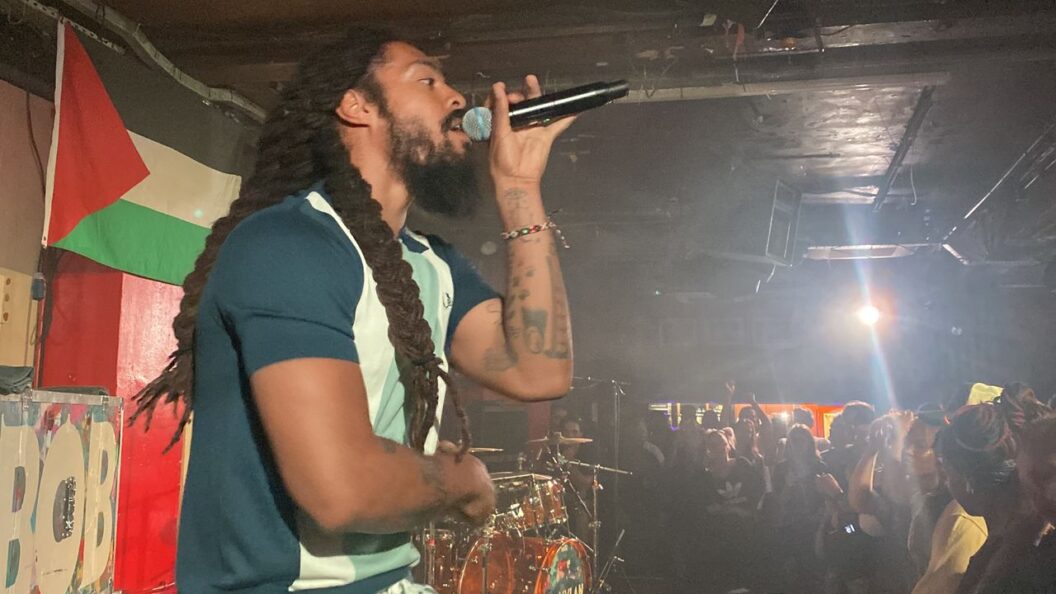Bob Vylan’s Controversial Comeback: A Night of Reflection at the 100 Club
On July 9, British punk-rap duo Bob Vylan returned to the stage for their first performance in England since their controversial set at Glastonbury. The duo, particularly frontman Bobby Vylan, faced backlash after leading a crowd chant of "Death, death to the IDF," which prompted significant discussions around artistic expression, responsibility, and the boundaries of free speech in music.
Acknowledging the Backlash
During their performance at the 100 Club in Soho, London, Bobby Vylan addressed the controversy explicitly. "I’m gonna try to keep my talkin’ to a minimum today," he said, referring to the backlash that followed their Glastonbury performance. Video footage captured the moment when members of the audience resumed the contentious chant, to which Vylan responded, “No, no, no, no, no, you’re gonna get me in trouble!”
Vylan humorously noted the selective nature of acceptable chants, stating, “Apparently, every other chant is fine, but you lot will get me in trouble.” He then redirected the crowd towards a more widely accepted chant: "Free, free Palestine," reflecting both a commitment to their message and an awareness of the surrounding legal and social ramifications.
Ongoing Investigations
The tension surrounding Bob Vylan is compounded by an ongoing investigation led by the Avon and Somerset Police over Vylan’s remarks regarding the Israeli Defense Forces (IDF). The Metropolitan Police is also examining previous comments made during a concert at London’s Alexandra Palace, where Vylan allegedly stated, “Death to every single IDF soldier.” These remarks have triggered further discussions on hate speech, political expression in music, and the fine line artists walk while addressing contentious subjects.
The fallout from their Glastonbury show has been substantial. Following the incident, Bob Vylan was dropped by their management agency, United Talent Agency, had their U.S. visas revoked, and were removed from a Manchester music festival lineup. In response to the controversy, Glastonbury organizers expressed their shock, stating they were “appalled” by the comments, and the BBC issued an apology for broadcasting the performance.
The Band’s Position
In the aftermath of the controversy, Bob Vylan released a statement defending their position. They clarified, “We are not for the death of Jews, Arabs or any other race or group of people. We are for the dismantling of a violent military machine," emphasizing their stance against violence rather than promoting hatred against any particular group.
The band’s comments reflect a growing trend in contemporary music where artists feel compelled to address political and social issues, often at personal and professional risk. This incident poses significant questions about the implications of perceived hate speech in the realm of political discourse.
Conclusion: Significance and Impact
The events surrounding Bob Vylan’s performances illustrate the complex interplay between art, activism, and the law. As artists increasingly engage with charged political topics, they navigate a landscape fraught with potential repercussions. The ongoing investigations into their comments, coupled with widespread public attention, highlight the growing scrutiny on public figures and the delicate balance between freedom of speech and community standards.
As this situation continues to unfold, it raises essential questions: How should artists express their political beliefs? What are the limits of acceptable speech in a performance context? Bob Vylan’s experience serves as a pivotal case study for aspiring artists and the industry alike, underscoring the significant weight that comes with a public platform in today’s complex sociopolitical climate.
For those interested in listening to Bob Vylan’s music, you can find their work online through various streaming platforms.









